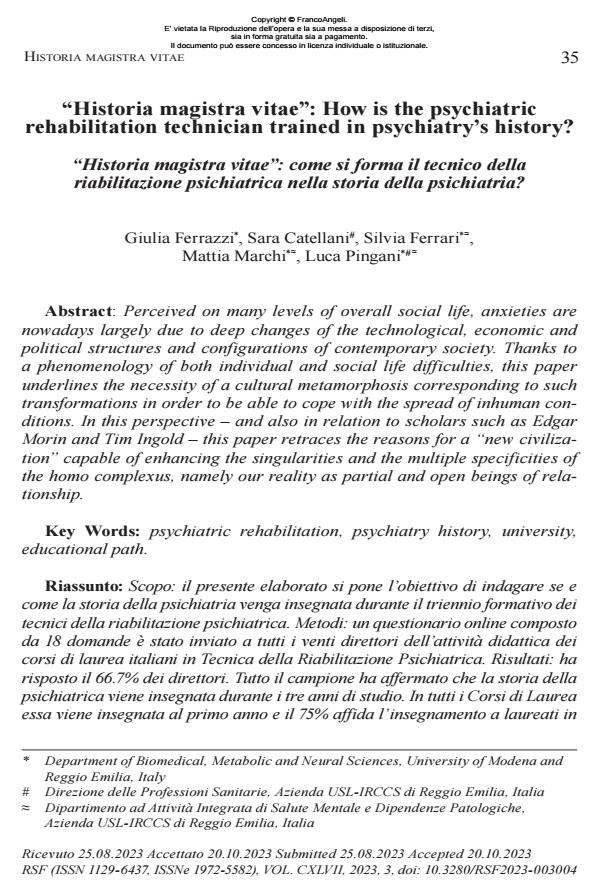"Historia magistra vitae": How is the psychiatric rehabilitation technician trained in psychiatry’s history?
Titolo Rivista RIVISTA SPERIMENTALE DI FRENIATRIA
Autori/Curatori Giulia Ferrazzi, Sara Catellani, Silvia Ferrari, Mattia Marchi, Luca Pingani
Anno di pubblicazione 2023 Fascicolo 2023/3
Lingua Inglese Numero pagine 14 P. 35-48 Dimensione file 702 KB
DOI 10.3280/RSF2023-003004
Il DOI è il codice a barre della proprietà intellettuale: per saperne di più
clicca qui
Qui sotto puoi vedere in anteprima la prima pagina di questo articolo.
Se questo articolo ti interessa, lo puoi acquistare (e scaricare in formato pdf) seguendo le facili indicazioni per acquistare il download credit. Acquista Download Credits per scaricare questo Articolo in formato PDF

FrancoAngeli è membro della Publishers International Linking Association, Inc (PILA), associazione indipendente e non profit per facilitare (attraverso i servizi tecnologici implementati da CrossRef.org) l’accesso degli studiosi ai contenuti digitali nelle pubblicazioni professionali e scientifiche.
Perceived on many levels of overall social life, anxieties are nowadays largely due to deep changes of the technological, economic and political structures and configurations of contemporary society. Thanks to a phenomenology of both individual and social life difficulties, this paper underlines the necessity of a cultural metamorphosis corresponding to such transformations in order to be able to cope with the spread of inhuman conditions. In this perspective - and also in relation to scholars such as Edgar Morin and Tim Ingold - this paper retraces the reasons for a "new civilization" capable of enhancing the singularities and the multiple specificities of the homo complexus, namely our reality as partial and open beings of relationship.
Scopo: il presente elaborato si pone l’obiettivo di indagare se e come la storia della psichiatria venga insegnata durante il triennio formativo dei tecnici della riabilitazione psichiatrica. Metodi: un questionario online composto da 18 domande è stato inviato a tutti i venti direttori dell’attività didattica dei corsi di laurea italiani in Tecnica della Riabilitazione Psichiatrica. Risultati: ha risposto il 66.7% dei direttori. Tutto il campione ha affermato che la storia della psichiatrica viene insegnata durante i tre anni di studio. In tutti i Corsi di Laurea essa viene insegnata al primo anno e il 75% affida l’insegnamento a laureati in Tecnica della Riabilitazione Psichiatrica. Solo un corso di laurea ha elaborato tesi di laurea su tematiche relative alla storia della psichiatria. Conclusioni: la storia della psichiatria rappresenta il punto di partenza del percorso di studi del tecnico della riabilitazione psichiatrica e rappresenta un elemento chiave nel profilo professionale di questa figura sanitaria.
Parole chiave:Riabilitazione Psichiatrica, Storia della Psichiatria, Università, Percorso Formativo
Giulia Ferrazzi, Sara Catellani, Silvia Ferrari, Mattia Marchi, Luca Pingani, "Historia magistra vitae": How is the psychiatric rehabilitation technician trained in psychiatry’s history? in "RIVISTA SPERIMENTALE DI FRENIATRIA" 3/2023, pp 35-48, DOI: 10.3280/RSF2023-003004